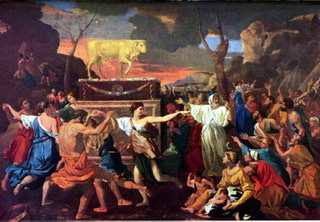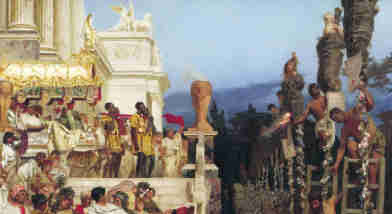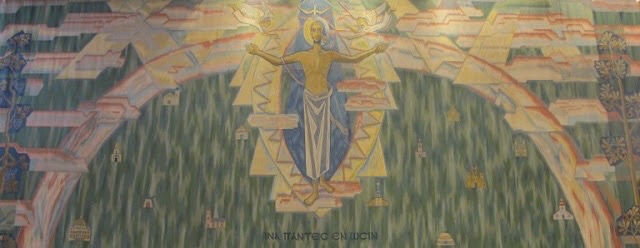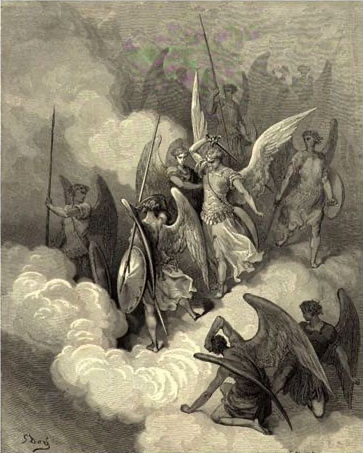Deceitfulness Of The Heart
The heart is deceitful above all things,
and it is exceedingly corrupt:
who can know it? (Jer. 17:9)
Because of the Fall of man, our human soul is completely under the dominion of our flesh. Before Adam fell, there were three spheres of authority:
- the kingdom of God,
- the human kingdom, and
- the kingdom of Satan.
Fall of Man
Today, there are only two kingdoms. Because of the Fall of man, the human kingdom is in thorough subjection to the kingdom of Satan.
By the process of our physical birth, this inheritance has been passed on to all of mankind. Since we are born in the same fallen flesh as our father Adam, we are in the kingdom of Satan from the moment of our birth. Only by being born again are we transferred from the kingdom of Satan into the kingdom of God.
If Adam had not fallen and had instead partaken of the tree of life, he and Eve would have had eternal life and would not have had any offspring. Nor would there have been any need for offspring, since God's purpose would have been fulfilled. Due to the fall, offspring became necessary for the fulfillment of God's purpose for man. Such offspring, however, are conceived in the flesh by the will of the flesh and therefore inherit the fallen nature of the flesh.
Now the natural man receiveth not the things of the Spirit of God: for they are foolishness unto him; and he cannot know them because they are spiritually judged. (1 Cor. 2:14)
Due to the Fall, man is 100 percent blind when it comes to discerning spiritual matters. Our heart is deceitful in our dealings with others and is most deceitful in our dealings with God.
Trust in Jehovah with all thy heart, and lean not upon thine own understanding: (Prov. 3:5).
The deceitfulness of the human heart is extremely subtle. Most of the time we are not even aware of its influence in our daily lives because it is entirely a part of our being and can only be exposed by spiritual enlightenment from God. The deceitfulness of the heart is the source of all the differences in Christianity and is, in our daily lives, the source of misunderstanding others.
As a helpful illustration, the following Scriptural examples are given.
Tree of Knowledge
And Jehovah God commanded the man, saying, of every tree of the garden thou mayest freely eat: but of the free of the knowledge of good and evil, thou shalt not eat of it. (Gen. 2:16‑17).
And they heard the sound of Jehovah God walking in the garden in the cool of a day: and the man and his wife hid themselves from the presence of Jehovah God amongst the trees of the garden. (Gen. 3:8)
Typical of human nature is Adam and Eve's response to God after they had disobeyed Him. Nothing could be more fruitless than attempting to hide from God, yet how very often we do so, too many of us for all of our lives.
And he said, I heard thy voice in the garden, and I was afraid, because I was naked; and I hid myself. And he said, Who told thee that thou wast naked? Hast thou eaten of the tree, whereof I commanded thee that thou shouldest not eat? (Gen. 3:10‑11)
Of course God already knew what happened; yet He gives Adam a chance to confess, for Adam’s own benefit. What is Adam’s response?
And the man said, The woman whom thou gavest to be with me, she gave me of the tree, and I did eat. (Gen. 3:12)
Notice Adam’s immediate response: not admitting any personal guilt but instead blaming Eve directly and even blaming God indirectly by insinuating that if God had not given Eve to him it would not have happened.
Now God confronts Eve.
And Jehovah God said unto the woman, what is this thou hast done? (Gen. 3:13)
God gets the same type of response, because of the fallen nature now in man.
And the woman said, The serpent beguiled me, and I did eat. (Gen. 3:13)
Eve completely ignores the fact that she had a choice in the matter and instead, just as Adam did, tries to place the blame elsewhere with the first words out of her mouth, "The serpent."
Cain’s Offering
But unto Cain and to his offering he had no respect. And Cain was very wroth, and his countenance fell. And Jehovah said unto Cain, Why art thou wroth? and why is thy countenance fallen? If thou doest well, shall it not be lifted up? and if thou doest not well, sin croucheth at the door: and unto thee shall be its desire, but do thou rule over it. And Cain told Abel his brother. And it came to pass, when they were in the field, that Cain rose up against Abel his brother, and slew him.
And Jehovah said unto Cain, where is Abel thy brother? And he said, I know not: am I my brother's keeper? And he said, What hast thou done? the voice of thy brother's blood crieth unto me from the ground. And now cursed art thou from the ground, which hath opened its mouth to receive thy brother's blood from thy hand; when thou tillest the ground, it shall not henceforth yield unto thee its strength; a fugitive and a wanderer shalt thou be in the earth. And Cain said unto Jehovah, My punishment is greater than I can bear. Behold, thou hast driven me out this day from the face of the ground; and from thy face shall I be hid; and I shall be a fugitive and a wanderer in the earth; and it will come to pass, that whosoever findeth me will slay me.... And Cain went out from the presence of Jehovah, and dwelt in the land of Nod, on the east of Eden. (Gen. 4:6‑14, 16)
God warned Cain in advance that the fallen nature in him was threatening to cause him to commit evil if he allowed it to do so. But Cain went ahead and slew Abel. Once again, when confronted by God, the fallen nature causes Cain to evade admitting the truth.
Even subtler than this, Cain, without consciously realizing it, does not hear what God actually tells him, but instead hears what his own heart deceives him into believing that God had said.
God cursed Cain so that he would have a harder time at making a living from the ground (as a further check to his flesh), but He did not drive Cain from the ground, as Cain asserts also. Even after Cain had committed the murder of Abel, God still did not remove His presence from him. (Evidently at this time the full effects of the Fall, coupled with the contributory influence of the world system, which had its beginnings shortly after this, had not yet caused a complete separation between God and man.)
Instead Cain, by his own choice, left the presence of God.
Golden Calf
And when the people saw that Moses delayed to come down from the mount, the people gathered themselves together unto Aaron, and said unto him,
Up, make us gods, which shall go before us; for as for this Moses, the man that brought us up out of the land of Egypt, we know not what is become of him.
And Aaron said to them, break off the golden rings, which are in the ears of your wives, of your sons, and of your daughters, and bring them unto me .... And he received it at their hand, and fashioned it with a graving tool, and made it a molten calf; and they said,
These are thy gods, O Israel, which brought thee up out of the land of Egypt. And when Aaron saw this, he built an altar before it; and Aaron made proclamation, and said, Tomorrow shall be a feast to Jehovah. …
And Moses said unto Aaron, what did these people unto thee, that thou host brought a great sin upon them?
And Aaron said, Let not the anger of my Lord wax hot: thou knowest the people, that they are set on evil. For they said unto me, make us gods, which shall go before us; for as for this Moses, the man that brought us up out of the land of Egypt, we know not what is become of him.
And I said unto them, Whosoever hath any gold, let them break it off: so they gave it me; and I cast it into the fire, and there came out this calf. (Exod. 32:1-2, 4-5, 21-24)
The people of Israel asked Aaron to make them gods, but there is nothing to indicate that they threatened him in any way.
Aaron then went to considerable personal effort to make the golden calf and an altar for it.
Then, when Moses confronts him about it, Aaron immediately passes the buck and blames everybody but himself. When he relates (only out of absolute necessity, you can be sure) his own part in the matter, he just says, in effect, “Well, I just threw the gold in the fire and this golden calf popped out all by itself.”
Truly these are our ancestors, for we are the same way. Again, this nature is so thoroughly a part of us that we are not conscious of its effect and influence.
And Jehovah spake unto Moses face to face, as a man speaketh unto his friend. (Exod. 33:11).
Waters of Meribah
Even a man as spiritual as Moses, completely without conscious awareness, was not immune to the deceitfulness of his own heart.
And Jehovah spake unto Moses, saying, Take the rod, and assemble the congregation, thou, and Aaron thy brother, and speak ye unto the rock before their eyes, that it give forth its water; . . .
And Moses and Aaron gathered the assembly together before the rock, and he said unto them, Hear now, ye rebels; shall we bring you forth water out of this rock? And Moses lifted up his hand, and smote the rock with his rod twice: . . .
And Jehovah said unto Moses and Aaron, Because ye believed not in me, to sanctify me in the eyes of the children of Israel, therefore ye shall not bring this assembly into the land which I have given them.... Aaron shall be gathered unto his people; for he shall not enter the land which I have given unto the children of Israel, because ye rebelled against my word at the waters of Meribah. (Num. 20:8, 10‑12, 24)
because ye trespassed against me in the midst of the children of Israel at the waters of Meribah of Kadesh, in the wilderness of Zin; because ye sanctified me not in the midst of the children of Israel. (Deut. 32:51).
Also Jehovah was angry with me for your sakes, saying, thou also shall not go in thither: (Deut. 1:37).
Let me go over, I pray, and see the good land beyond the Jordan, that goodly hill country, and Lebanon." But the Lord was angry with me on your account, and would not hearken to me; and the Lord said to me, "Let it suffice you; speak no more to me of this matter." (Deut. 3:25-26)
The Lord instructed Moses to tell the rock to yield water. However, Moses lost his temper and, contrary to God's instructions, struck the rock instead. At least twice after that, the Lord told Moses that he was to blame, yet, whenever Moses discussed the incident with other people he felt the need to justify himself by putting the blame elsewhere, on the people of Israel.
Notice especially in Deuteronomy 3:25‑26 how Moses is quoting what God has said, but between quotes he interjects his own words of self justification, undoubtedly because the subject at hand was hitting too close to home. This is highly significant in two ways.
- Firstly, it shows how precise God's word is.
- Secondly, it exposes how our fallen nature is constantly seeking to interject itself and interfere in spiritual matters. This is why, in the New Testament age of the spirit we are told: "It is God that justifieth". (Rom. 8:33). Any attempt to justify ourselves can only have as its source our fallen human nature.
Nature of Children
For those who still have any doubts about the true nature of man, I offer the following more pertinent illustrations.
One of the first, and most challenging, problems in the raising of children is that of teaching them to be truthful. More often than not, in the first several instances when a child is confronted with a wrongdoing, the child will bend the truth if not overtly lie. It matters not how obvious their guilt is, this is still the response even when the child is caught red‑handed. Why?
Because at this early age a child has not yet learned the proper response dictated by cultural influence and responds instead according to the fallen human nature. No one teaches children to lie, yet, because of our fallen nature; children have to be taught to tell the truth.
Nature of Adults Unmasked
From the moment we come into this world, cultural influences, through societal pressures and legal constraints, teach us to mask our real nature; with the result that we think that we’re not such bad people and it is nigh impossible for us to realize that this might not be the case after all.
But there is one time and one time only when, in spite of this, our true nature is revealed. When a person totally loses their temper, then and only then, their true fallen nature is revealed to the world.
Click HERE to read more on the web about The Deceitfulness of the Heart.






Comments